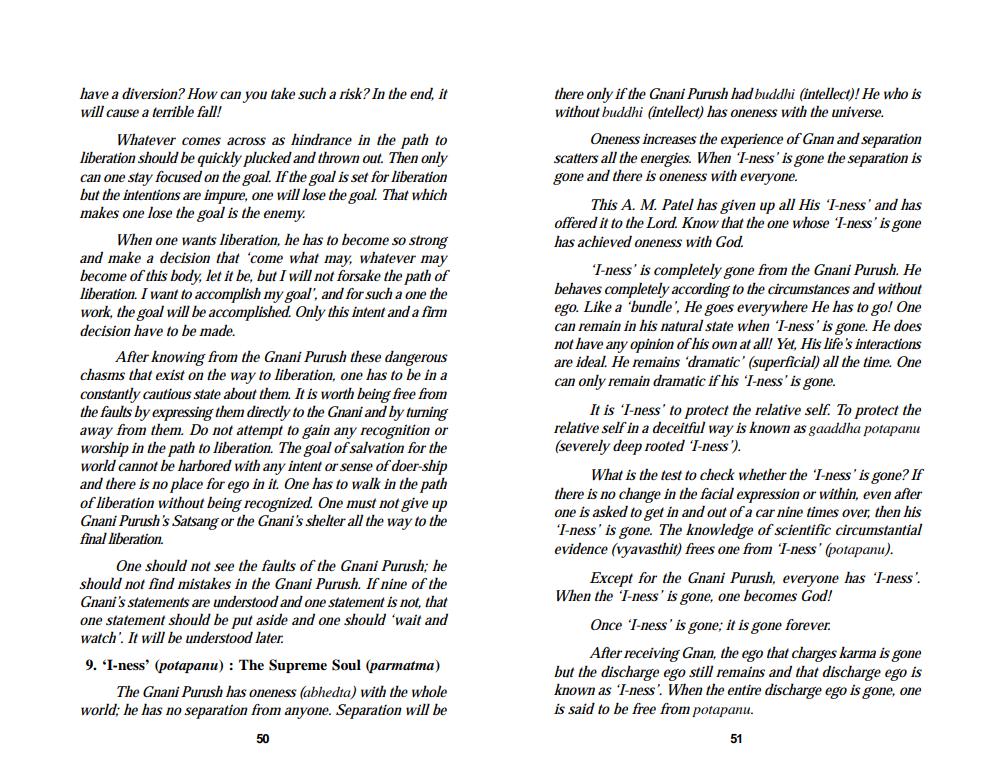________________
have a diversion? How can you take such a risk? In the end, it will cause a terrible fall!
Whatever comes across as hindrance in the path to liberation should be quickly plucked and thrown out. Then only can one stay focused on the goal. If the goal is set for liberation but the intentions are impure, one will lose the goal. That which makes one lose the goal is the enemy.
When one wants liberation, he has to become so strong and make a decision that 'come what may, whatever may become of this body, let it be, but I will not forsake the path of liberation. I want to accomplish my goal', and for such a one the work, the goal will be accomplished. Only this intent and a firm decision have to be made.
After knowing from the Gnani Purush these dangerous chasms that exist on the way to liberation, one has to be in a constantly cautious state about them. It is worth being free from the faults by expressing them directly to the Gnani and by turning away from them. Do not attempt to gain any recognition or worship in the path to liberation. The goal of salvation for the world cannot be harbored with any intent or sense of doer-ship and there is no place for ego in it. One has to walk in the path of liberation without being recognized. One must not give up Gnani Purush's Satsang or the Gnani's shelter all the way to the final liberation.
One should not see the faults of the Gnani Purush; he should not find mistakes in the Gnani Purush. If nine of the Gnani's statements are understood and one statement is not, that one statement should be put aside and one should 'wait and watch'. It will be understood later.
9. 'I-ness' (potapanu): The Supreme Soul (parmatma)
The Gnani Purush has oneness (abhedta) with the whole world; he has no separation from anyone. Separation will be
50
there only if the Gnani Purush had buddhi (intellect)! He who is without buddhi (intellect) has oneness with the universe.
Oneness increases the experience of Gnan and separation scatters all the energies. When 'I-ness' is gone the separation is gone and there is oneness with everyone.
This A. M. Patel has given up all His 'T-ness' and has offered it to the Lord. Know that the one whose 'I-ness' is gone has achieved oneness with God.
'I-ness' is completely gone from the Gnani Purush. He behaves completely according to the circumstances and without ego. Like a 'bundle', He goes everywhere He has to go! One can remain in his natural state when 'I-ness' is gone. He does not have any opinion of his own at all! Yet, His life's interactions are ideal. He remains 'dramatic' (superficial) all the time. One can only remain dramatic if his 'I-ness' is gone.
It is 'I-ness' to protect the relative self. To protect the relative self in a deceitful way is known as gaaddha potapanu (severely deep rooted 'I-ness').
What is the test to check whether the 'I-ness' is gone? If there is no change in the facial expression or within, even after one is asked to get in and out of a car nine times over, then his 'I-ness' is gone. The knowledge of scientific circumstantial evidence (vyavasthit) frees one from 'I-ness' (potapanu).
Except for the Gnani Purush, everyone has 'I-ness'. When the 'T-ness' is gone, one becomes God!
Once 'I-ness' is gone; it is gone forever.
After receiving Gnan, the ego that charges karma is gone but the discharge ego still remains and that discharge ego is known as 'I-ness'. When the entire discharge ego is gone, one is said to be free from potapanu.
51




